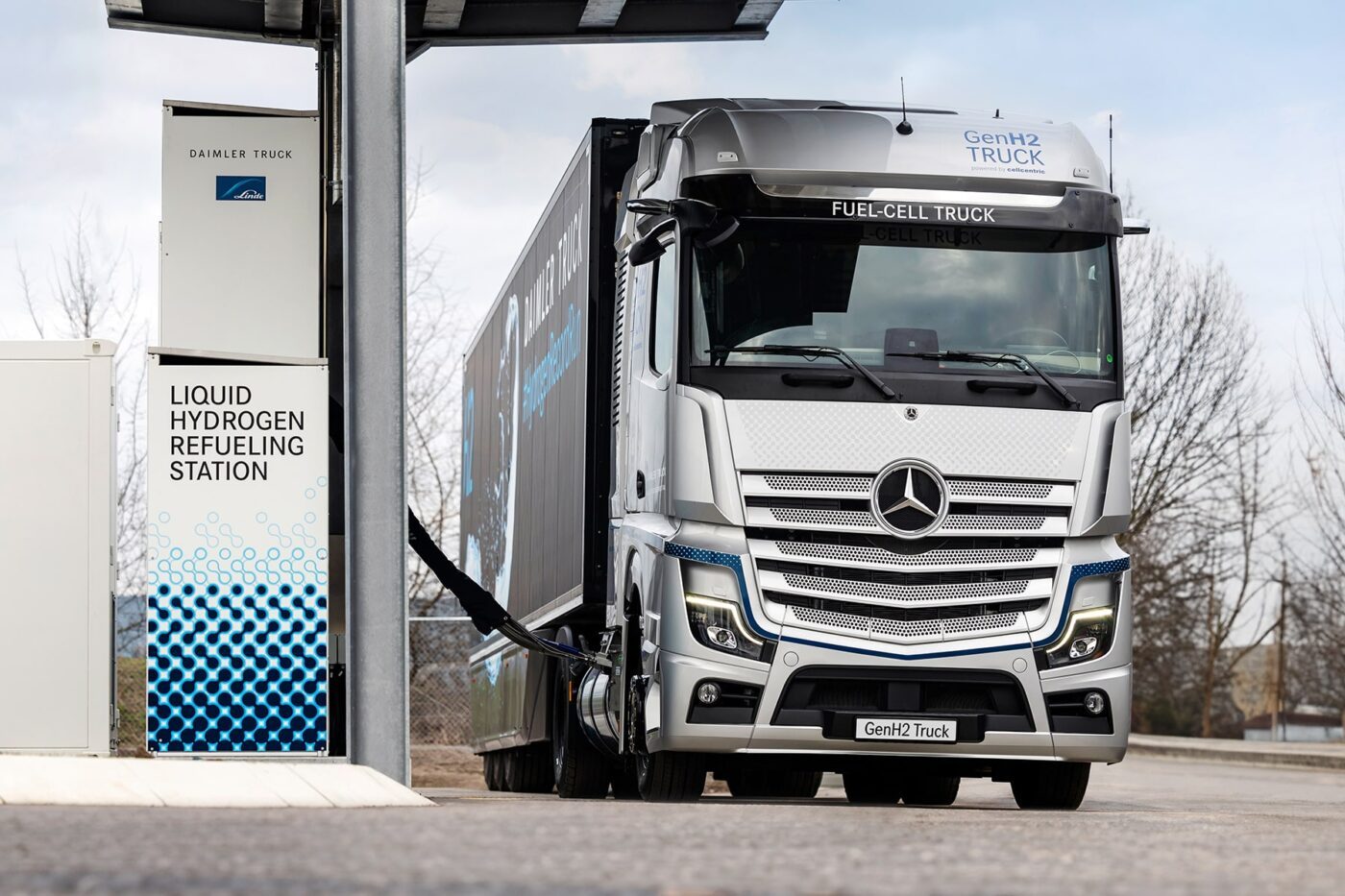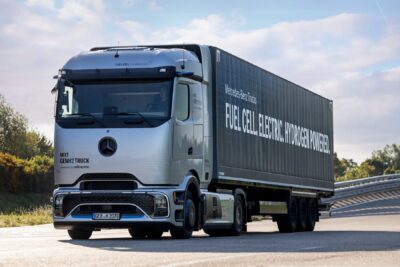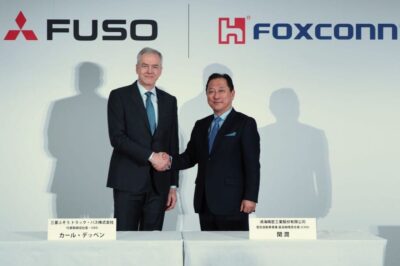Daimler Truck’s GenH2 Truck enters second phase of customer testing
Daimler Truck states that it intends to prepare the GenH2 Truck for series production through the new round of testing. To this end, the five companies mentioned will each put a Mercedes-Benz GenH2 Truck into operation on their regular logistics routes within Germany. In contrast, the tests initiated in the summer of 2024 were still ‘customer-oriented’ trials. The requirements for fuel cell trucks are therefore increasing.
The aim is not only to test cross-industry applications and map additional operating scenarios, but “to ensure that all findings feed directly into further vehicle development as well as preparations for sales and service processes,” according to the Stuttgart-based manufacturer. All five fuel cell trucks will be used by the partners over a period of one year on different routes and in various logistics applications – from temperature-controlled pharmaceutical transport to general cargo transport in international long-distance traffic.
The manufacturer says the next step will be a small series of fuel cell trucks. Daimler Truck has already started the development phase for the next generation. “As part of a small-series production, a total of 100 tractor units are to be built at the Mercedes-Benz plant in Woerth and put into customer operations starting at the end of 2026,” the company says. Regular series production, on the other hand, is not expected until after 2030. This is because Daimler Truck is under enormous pressure and announced austerity measures in the summer that include deprioritising the GenH2 Truck: as a result, the planned series production has been postponed from 2027 to the early 2030s.
This is because “the expansion of hydrogen refueling infrastructure is progressing significantly slower than expected. As a result, customers will not be able to deploy hydrogen trucks in large numbers in the next few years,” writes Daimler Truck. In addition to postponing the start of series production, the group also expects lower volumes. Furthermore, the Stuttgart-based company is initially focusing on the development of hydrogen drives in Europe only. The dual strategy of battery- and hydrogen-powered vehicles, therefore, continues to apply to the European domestic market. This is no longer necessarily the case for other markets.
Daimler Truck first announced its plans to develop and build a fuel cell truck in 2020. The first customer trials were conducted with Air Products, Amazon, Holcim, Ineos and Wiedmann & Winz. Here, too, five vehicles were used, which, according to the company, covered a total of 225,000 kilometres. Depending on the application, average hydrogen consumption ranged between 5.6 kilograms and 8.0 kilograms per 100 kilometres, with an average total train weight between 16 and 34 tonnes, according to the company.
Now, in the second phase, the partner companies Hornbach, Reber Logistik, Teva Germany (with the Ratiopharm brand), Rhenus and DHL Supply Chain are taking over. Katrin Hölter, CEO of DHL Supply Chain Germany & Alps, states that the GenH2 truck is being tested in her company in combination with fully electric refrigerated trailers. Hornbach authorised signatory Andreas Back wants to send the fuel cell truck on long-distance routes: “It will be used in our recyclable materials fleet in long-haul transport. The recyclable materials fleet has been a success story for over 10 years, making a significant contribution to a closed-loop recycling system.” Andreas Burkhardt, Managing Director of Teva Germany, also announced that he will use the model in national long-distance transport. Reber Logistik wants to use its model specifically in the region around Duisburg and Wörth. Rhenus also plans to start testing in Duisburg.
At the heart of the GenH2 truck are two fuel cell systems from the Cellcentric joint venture with a system output of 300 kW (2x 150 kW). A 70 kWh battery provides an additional 400 kW for a limited time. This is used during peak loads when accelerating or driving uphill. In a pre-series version, the two electric motors are designed for a total of 2 x 230 kW continuous power and 2 x 330 kW maximum power. The torque is 2 x 1,577 Nm and 2 x 2,071 Nm, respectively. Daimler Truck also cites the cooling and heating system as a ‘core element’ of the drive train and part of the ‘sophisticated operating strategy of fuel cell and battery systems’. As this system keeps all components at the appropriate operating temperature, the longevity of the system is expected to increase.
With a total weight of around 40 tonnes, the GenH2 truck offers a payload of approximately 25 tonnes. Liquid hydrogen (sLH2) is used as the energy source. This means that testing the GenH2 trucks is much more dependent on infrastructure than BEVs: the vehicles can currently only be refuelled at two special filling stations for sLH2 in Wörth am Rhein (Rhineland-Palatinate) and in the Duisburg area (North Rhine-Westphalia). Linde is the partner for the filling stations. However, unlike gaseous hydrogen, liquid hydrogen ensures that the range of hydrogen trucks exceeds 1,000 kilometres, as Daimler Truck itself demonstrated in September 2023: a road-approved prototype travelled 1,047 kilometres on a single tank of fuel.
This article was first published by Cora Werwitzke for electrive’s German edition.





0 Comments